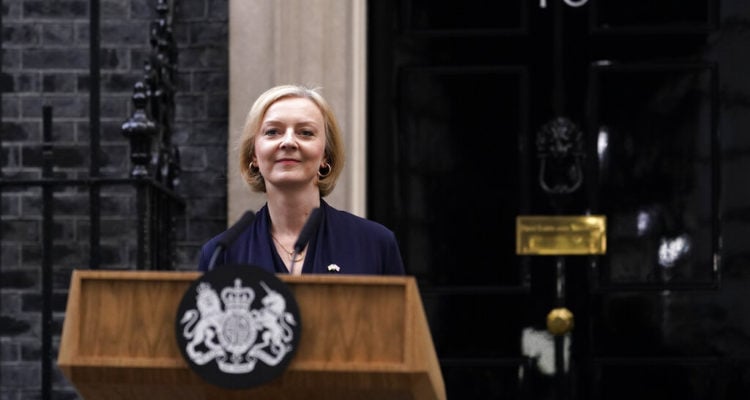Truss, who said she was considering moving her country’s embassy to Jerusalem, was described by the Israeli prime minister as a “great friend of Israel.”
By Associated Press
British Prime Minister Liz Truss resigned Thursday — bowing to the inevitable after a tumultuous, short-lived term in which her policies triggered turmoil in financial markets and a rebellion in her party that obliterated her authority.
Making a hastily scheduled statement outside her 10 Downing Street office, Truss acknowledged that “I cannot deliver the mandate on which I was elected by the Conservative Party.”
Hers is the third resignation by a Conservative prime minister in as many years and leaves a divided party seeking a leader who can unify its warring factions. Truss, who said she will remain in office for a few more days while that process unfolds, has been prime minister for just 45 days.
Just a day earlier she had vowed to stay in power, saying she was “a fighter and not a quitter.” But Truss couldn’t hold on any longer after a senior minister quit her government with a barrage of criticism and a vote in the House of Commons descended into chaos and acrimony just days after she was forced to abandon many of her economic policies.
A growing number of lawmakers had called for Truss to resign after weeks of turmoil sparked by her economic plan. When it was unveiled by the government last month, the plan triggered financial turmoil and a political crisis that has seen the replacement of Truss’ Treasury chief, multiple policy U-turns and a breakdown of discipline in the governing Conservative Party.
Earlier, Conservative lawmaker Simon Hoare said the government was in disarray.
“Nobody has a route plan. It’s all sort of hand-to-hand fighting on a day-to-day basis,” he told the BBC on Thursday.
Truss quit after a meeting with Graham Brady, a senior Conservative lawmaker who oversees leadership challenges. Brady was tasked with assessing whether the prime minister still has the support of Tory members of Parliament — and it seemed she did not.
“It’s time for the prime minister to go,” Conservative lawmaker Miriam Cates said earlier Thursday. Another, Steve Double, said of Truss: “She isn’t up to the job, sadly.” Legislator Ruth Edwards said “it is not responsible for the party to allow her to remain in power.”
Lawmakers’ anger grew after a Wednesday evening vote over fracking for shale gas — a practice that Truss wants to resume despite opposition from many Conservatives — produced chaotic scenes in Parliament.
With Conservatives holding a large parliamentary majority, an opposition call for a fracking ban was easily defeated. But there were displays of anger in the House of Commons, with party whips accused of using heavy-handed tactics to gain votes.
International Trade Secretary Anne-Marie Trevelyan, sent onto the airwaves Thursday morning to defend the government, insisted the administration was providing “stability.” But she was unable to guarantee Truss would lead the party into the next election.
“At the moment, I think that’s the case,” she said.
With opinion polls giving the Labour Party a large and growing lead, the Conservative Party decided its only hope of avoiding electoral oblivion was to replace Truss. But they remain divided over who exactly should do that.
The party is keen to avoid another divisive leadership contest like the race a few months ago that saw Truss defeat ex-Treasury chief Rishi Sunak. Among potential replacements — if only Conservative lawmakers can agree — are Sunak, House of Commons leader Penny Mordaunt and newly appointed Treasury chief Jeremy Hunt.
Truss, who said she was considering moving her country’s embassy to Jerusalem, was described by the Israeli prime minister as a “great friend of Israel” and lambasted by the Palestinians.
Whoever it is will be the country’s third prime minister this year alone. A national election doesn’t have to be held until 2024.
World Israel News contributed to this report.





